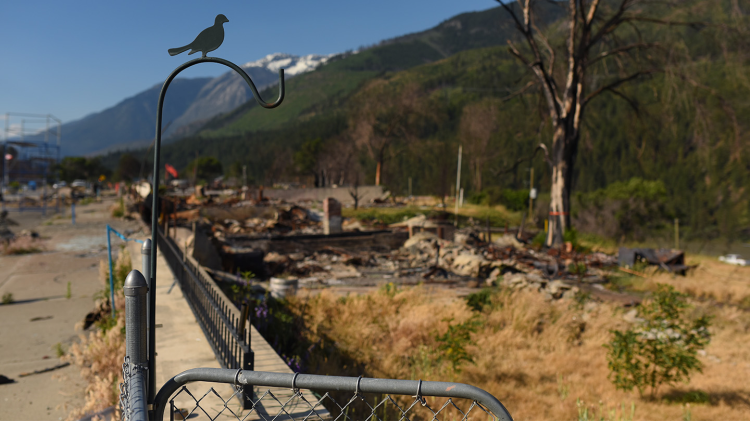Fires rage, floods devastate, storms surge: every day we hear about the impacts of climate change, with ever-increasing casualty counts and infrastructure damage tipping into the billions. But all too often, climate politics and media reporting favour the voices of experts over victims, resulting in a lost opportunity to act on the first-person experiences of climate-change survivors.
Now, a new initiative led by the University of Victoria (UVic) will close that critical gap in narrative and knowledge, thanks to a six-year, $2.5-million Social Sciences and Humanities Research Council Partnership Grant announced last week.
From Catastrophe to Community: A People's History of Climate Change will train 500 post-secondary students and professional journalists to document the experience of 1,000 survivors around the world and share their wisdom.
"Climate change isn't a threat tomorrow. It's a trauma today. And when someone lives through that kind of trauma, they need a different climate story where they feel seen in their experiences and know the harm caused to them will be repaired both now and in the future."
~ Sean Holman, UVic writing professor and director of From Catastrophe to Community

Climate change is increasing the frequency and intensity of weather-related disasters, such as the 2021 Lytton Creek fire that destroyed 90 percent of the buildings in Lytton, Canada. Credit: Climate Disaster Project/Phil McLachlan
The project will result in the creation of documentaries with APTN Investigates, news features, an anthology and a travelling museum exhibition that will launch at Winnipeg's Canadian Museum for Human Rights and the Museum of Vancouver. In the process, the From Catastrophe to Community team will develop new trauma-informed, human-rights-based storytelling practices to support the recovery of communities impacted by climate change and other humanitarian crises.
"This partnership grant is an example of UVic's broad leadership in climate action," says Alexandra D'Arcy, UVic associate vice-president of research. "Across campus, our researchers are working to tackle the global problem of climate change, which is also a profoundly local problem, as extreme weather events impact our loved ones and our ecosystems."
From Catastrophe to Community was awarded to Holman and a team of researchers, curators, journalists and artists, including co-directors at the Museum of Vancouver, Simon Fraser University, Trent University, the University of Denver Colorado, the University of Stirling, the Université du Québec à Montréal, and York University.
"Each part of our society needs to work together to confront the traumatic impacts of our warming world," says Holman. "And that's exactly what From Catastrophe to Community is doing: bringing museums, news outlets, theatre companies, post-secondary institutions, research agencies and survivors together to help us to realize a more just and equitable future that honours the human dignity of disaster communities."
Organizations from Brazil, Malawi, Africa, the UK, the US and other countries to be selected by project partners at Covering Climate Now and Journalists for Human Rights are part of From Catastrophe to Community. Collectively, these 27 partners have committed more than $4 million in matching contributions to the project. From Catastrophe to Community builds on the success of the award-winning Climate Disaster Project a teaching newsroom founded at UVic by Holman in 2021 in their role as the Wayne Crookes Professor of Environmental and Climate Journalism, funded by visionary Vancouver business leader, humanitarian and philanthropist Wayne Crookes.
To date, the Climate Disaster Project has trained more than 250 students in trauma-informed journalism techniques and with the assistance of post-secondary partners in Canada and around the world co-created more than 320 verbatim narrative packages of climate survivors worldwide. Highlights in the past year alone include a series of survivor narratives published in The Guardian during 2024's COP29 UN Climate Change Summit, the creation of the award-winning verbatim play Eyes of the Beast: Climate Disaster Survivor Stories with Neworld Theatre (which ran in Victoria and Vancouver), and the presentation of survivor narratives at cultural institutions including UCLA's Sci Art Gallery, the Royal BC Museum and the Kamloops Art Gallery.










